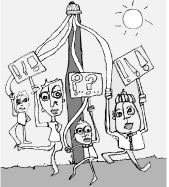MAY DAY IS two weeks away, but spring has already arrived in Seattle. The weather is warming up and everything is in bloom this weekend—including dissent.
Filmmaker Michael Moore is in town, speaking at Town Hall. David Barsamian (the host of Alternative Radio who is best known as Noam Chomsky’s confidant of record) is at the University of Washington. Legendary Native American activist and Green Party vice presidential candidate Winona LaDuke visits Tacoma. A National Day of Action Against Something or Another (Palestine, Iraq, threats to civil liberties, globalization, the War on Terrorism—there’s lots to choose from) will be observed with protests around the country, including Seattle, on Sat., April 20. Local peace groups will gather at Westlake Park at noon—actually, 11:55 a.m., in a play on the old nuclear “minutes to midnight” motif, focusing on the newly hyperactive American military juggernaut.
More noisily, Reclaim the Streets! will mass at Seattle Central Community College on Capitol Hill later Saturday afternoon. RTS! is a loosely organized anarchist movement whose last attempt at a street party resulted in aggressive policing and some broken windows (in that order) last August. This time, the Seattle police have reportedly asked that the college close its campus as a security precaution, an ominous sign that perhaps both sides will be spoiling for a confrontation.
But with all that going on—and the issues involved in these protests and programs are all timely and critical—perhaps the most interesting events this weekend will be held away from the cameras and crowds.
Two conferences, with completely different constituencies but equally compelling mandates, are coming to town. Downtown, Amnesty International USA’s Annual General Meeting holds court; up at UW’s Ethnic Cultural Center, the conference Community-Based Solutions for Environmental Health and Justice looks at the intersection of environmental activism and urban communities, especially the poorer parts of town.
The UW conference is the handiwork of the Community Coalition for Environmental Justice (CCEJ), a local grassroots group that for years has quietly been organizing among Seattle’s poorer, nonwhite neighborhoods. Two years ago, CCEJ helped inspire the Veterans Affairs hospital to shut down its incinerator on Beacon Hill; more recently, Long Painting agreed to move its operations farther away from Georgetown residential areas. At present, CCEJ is surveying sources of pollution in South Park; executive directory Yolanda Sinde says the group will go door-to-door in an organizing campaign this summer. “Environmentalism gets lumped in as a white, middle-class movement,” Sinde says. “People of color have been organized on environmental issues since the mid-’80s, along with economic justice. You can’t separate the two.”
The weekend conference will bring together people doing such work around the region; presenters include legendary Chicana labor organizer Dolores Huerto and Nigerian activist Diana Barikor-Wiwa, sister-in-law of the martyred Ken Sara-Wiwa. But it won’t be the only conference in town with an international pedigree.
The Amnesty International (AI) meeting—the annual convention of the U.S. chapter of the world’s most famous human rights group—features a videotaped speech by United Nations High Commissioner for Human Rights Mary Robinson and a keynote from Rodolfo Montiel Flores, a Mexican environmental activist who was recently released from prison after a long struggle over logging in southern Guerrero state.
It’s easy to take Amnesty International for granted. AI and similar groups—like Human Rights Watch—meticulously document abuses of power (by corporations, paramilitaries, and other private parties, as well as states) around the world, often in areas—like the Balkans, Afghanistan, Central Asia, or our own prison system—where events turn out to be far more relevant to our lives than we first think. By shining a light on these abuses, AI saves lives. Its letter-writing campaigns and pressure on foreign governments can be enormously effective in freeing political prisoners, ending torture, and protecting targeted racial, ethnic, religious, and political minorities.
The newscasts will follow the noise and police squadrons, but movements for change are usually both quieter and more dramatic. Both AI and CCEJ represent the types of groups and issues that often serve as many people’s introduction to civic activism. Whether it’s human rights on the other side of the world or a toxic incinerator on the other side of the backyard fence, the essential message is the same: We can make a difference in what goes on in our world. The peace groups and global justice advocates out protesting this weekend know it, too. Get involved.
For information on CCEJ or its conference, call 720-0285 or check www.ccej.org. Information on the AIUSA Annual General Meeting is available at www.amnestyusa.org/events/agm2002.







